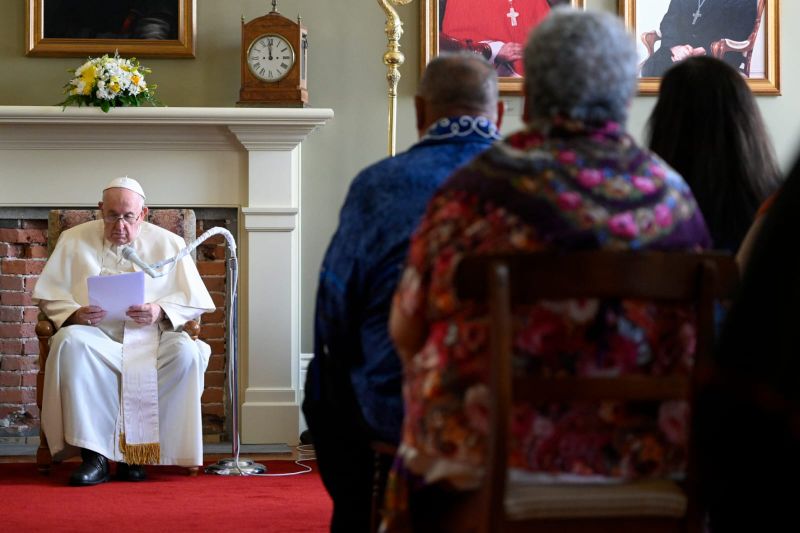
U.S. and Canadian bishops join Vatican’s condemnation of colonialist ‘doctrine of discovery’
 Pope Francis address representatives of Canada’s indigenous peoples at the archbishop’s residence in Québec City. / Vatican Media
Pope Francis address representatives of Canada’s indigenous peoples at the archbishop’s residence in Québec City. / Vatican Media
Washington D.C., Mar 30, 2023 / 14:00 pm (CNA).
The U.S. and Canadian bishops released statements Thursday praising the Vatican’s repudiation of the “doctrine of discovery,” which has been used in the past to justify European colonialism in the Americas and throughout the world.
The doctrine of discovery is a philosophical, political, and legal theory that posits that European colonizers have the right to expropriate indigenous lands and property.
The theory has been said to have its origin in certain 15th-century papal bulls including Dum Diversas, Romanus Pontifex, and Inter Caetera, and has been invoked by many, including the U.S. Supreme Court in the 1823 case Johnson v. McIntosh.
On Thursday, a joint statement of the Vatican’s Dicasteries for Culture and Education and for Promoting Integral Human Development formally denounced the doctrine of discovery, saying it “is not part of the teaching of the Catholic Church” and that the Church “repudiates those concepts that fail to recognize the inherent human rights of indigenous peoples.”
In an official statement, the secretary for the United States Conference of Catholic Bishops (USCCB), Archbishop Paul Coakley, responded by saying: “We welcome the [Vatican] statement’s renewed repudiation and condemnation of the violence and injustices committed against Native and Indigenous peoples as well as the Church’s ongoing support for their dignity and human rights.”
“In the centuries that followed the papal bulls at issue, many popes boldly proclaimed the God-given rights owed to all peoples, but we must also confront those moments when individual Christians lacked such boldness or clarity,” Coakley said. “There were times when Christians, including ecclesiastical authorities, failed to fully oppose destructive and immoral actions of the competing colonial powers. In this regard, we too express deep sorrow and regret.”
“These papal bulls did not adequately reflect the equal dignity and rights of Indigenous peoples,” the Canadian Conference of Catholic Bishops (CCCB) said in an official statement, adding that the bulls “were manipulated for political purposes by competing colonial powers; and that Indigenous peoples suffered the terrible effects of the assimilation policies of colonizing nations.”
Echoing the Vatican’s statement, the Canadian bishops recalled Pope Francis’ words during a Quebec address in which he said: “Never again can the Christian community allow itself to be infected by the idea that one culture is superior to others, or that it is legitimate to employ ways of coercing others.”
During what he described as a “penitential pilgrimage,” Pope Francis spoke with Indigenous Canadians and listened to their complaints regarding their treatment by colonizers and the Catholic Church.
The CCCB also praised the Vatican’s recognition of the United Nations Declaration on the Rights of Indigenous Peoples, which if implemented, the CCCB says, “would help to improve the living conditions of Indigenous peoples, to protect their rights, as well as to support their self-development in continuity with their identity, language, history, and culture.”
Both the U.S. and Canadian bishops echoed the Vatican’s sentiment expressed in the joint dicastery statement, saying though the Church has defended the rights of the weak and poor throughout history, “many Christians have committed evil acts against Indigenous peoples for which recent popes have asked forgiveness on numerous occasions.”
According to both bishops’ statements, the USCCB and CCCB, with the encouragement of the Vatican, are “exploring” the establishment of an academic symposium for continued dialogue between indigenous and Catholic scholars.
“As a Church, it is important for us to fully understand how our words have been used and misused to justify acts that would be abhorrent to Jesus Christ,” Coakley said. “We hope for more dialogue among Indigenous and Catholic scholars to promote greater and wider understanding of this difficult history.”
“May God bless with healing all those who continue to suffer the legacy of colonialism, and may we all offer true aid and support,” Coakley concluded. “By God’s grace, may we never return to the way of colonization but rather walk together in the way of peace.”

